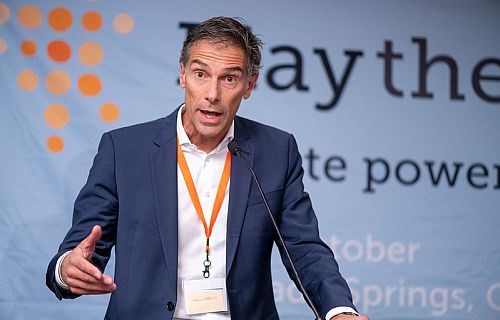Mega-events and human rights: Where do we draw the line?
In a session on mega-events, where FIFA’s record on a range of issues from the carbon footprint of the World Cup to human rights came under fire, Federico Addiechi said of Iran: “We’re not completely happy about the ending. For us, it’s not enough. It’s not about the FIFA World Cup qualifiers but about football across the country.”
Addiechi also said that the international governing body of football was looking into the recycling of artificial pitches, pledged that a carbon neutral World Cup would one day be staged, and listed the human rights issues that FIFA has addressed including sexual abuse in Afghanistan.
Human rights are part of the hosting agreement and therefore part of the contract to stage a FIFA World Cup, said Addiechi, who pointed out that labour rights have been included since November 2017.
2016: the year of change?
Gigi Alford, director of sports and human rights at the World Players Association, identified 2016 as the year that governing bodies began to change their approach to human rights and mega events.
She said: “Those awarded after this moment show a marked improvement. Those that were awarded before 2016 suffer from the same major crises. It’s not true across the board. What makes a difference is the level of engagement?”
“Different sports bodies are at different stages. Some are really embracing it, some are applying it to some extent but are not comfortable with other parts, while some have rejected it.”
On the same panel, Professor Andrew Zimbalist from Smith College in the USA looked at the changes implemented by the International Olympic Committee (IOC) to their bidding processes to address not human rights but an alarming slide in potential hosts.
Two sets of IOC reforms, Agenda 2020 and the New Norm, were, said Zimbalist, a “response to new market conditions” but still failed to address a slide in the number of bidders. This has resulted in a shift away from a bidding process to what Zimbalist described as a “one to one conversation” between the IOC and potential hosts.
“They have now ended competitive bidding, but this was the model that the IOC relied upon for decades,” commented Zimbalist. “They have taken a process that was once public and made it private. At the end of the day, this last reform promised a lot but is really empty.”
Another spin-off from these reforms is that the Olympics are in a “moment of historic unpopularity,” according to Jonny Coleman, co-founder of NOlympics LA, which is a grassroots anti-Olympics movement launched in 2017 to address the negative impact of Los Angeles hosting the 2028 Olympics.
Coleman claims that the current crisis in Los Angeles, where he says there are an estimated 60,000 homeless people with three dying every day, has its origins in the city hosting the 1984 Olympics.
Hosting the Games again in nine years will “compromise civic resources for decades,” said Coleman, who added: “If you kick the Olympics out of LA, what will it look like? Will it go to an undemocratic country?”
Difficult places
Niels Nygaard, Vice President of the European Olympic Committees, pointed out that some states in the USA still had the death penalty as he addressed the pros and cons of staging mega-events in “difficult places.”
“Where do we draw the line?” asked Nygaard rhetorically. “As long as the IOC makes a decision in full transparency and decided by the majority, we have to respect that.”
Countries like Azerbaijan and Belarus took the opportunity to host the new European Games in 2015 and 2019 to be part of the “European family,” conceded Nygaard, but there was also a lack of bidders.
He admitted that taking a mega-event to a difficult place risks legitimising a country, which lacks human rights but stressed that this also opens up a dialogue and forces the country to open up.
If human rights are under attack, what is needed is an approach that offers a remedy said Mary Harvey, chief executive officer of the Centre for Sport & Human Rights, which looks to use collective action as a response.
Addiechi said that FIFA was providing a remedy through engagement and that the title of the session, ‘Duel or dialogue?’, was outdated. “The relevant question is how FIFA and other bodies make sure the right preparations are in place.”
Only time will tell what the impact of those preparations for future mega-events like the World Cup and the Olympics will have on human rights.
In more than 40 sessions, over 170 speakers will present their thoughts and oponions on a wide range of the most topical questions in world sport during the 11th Play the Game conference, taking place in Colorado Springs, USA, 13-16 October 2019.







